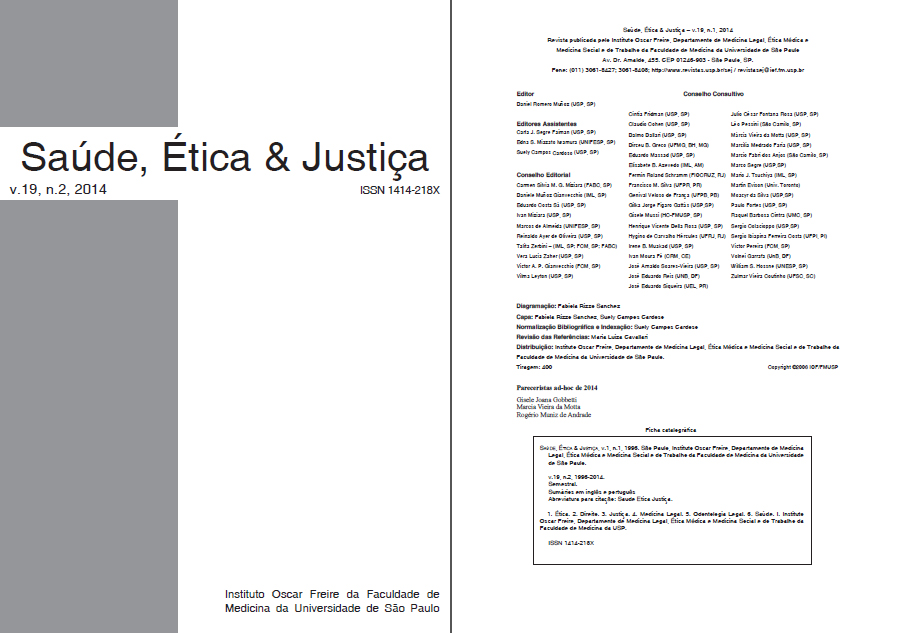Condições norteadoras para caracterização de incapacidade laborativa por epilepsia
DOI:
https://doi.org/10.11606/issn.2317-2770.v19i2p67-77Palavras-chave:
Pessoas com deficiência, Epilepsia, Avaliação da capacidade de trabalho, Prova pericial.Resumo
A epilepsia é problema de Saúde Pública e importante causa de incapacidade laborativa no Brasil e no mundo, sendo condição de interesse no contexto médico-pericial. OBJETIVO: Descrever condições norteadoras para caracterização de incapacidade laborativa por epilepsia. MATERIAL E MÉTODO: Revisão de literatura. RESULTADOS E DISCUSSÃO: O diagnóstico de epilepsia por si só não é sinônimo de incapacidade. Grande parte dos casos tem bom prognóstico com controle do quadro e preservação da capacidade laborativa. Entretanto, incapacidade laborativa pode advir dessa condição e, em geral, relaciona-se às suas repercussões somáticas ou psíquicas, comorbidades psiquiátricas, efeitos colaterais das drogas antiepiléticas e quando se verifica risco à saúde do trabalhador e/ou a terceiros. São fatores que favorecem a presença de incapacidade: crises frequentes, crises com perda de consciência, crises de início súbito, crises sem fatores desencadeantes, crises em vigília, não adesão ao tratamento, alcoolismo ou uso de outras drogas, epilepsia de causas estruturais, metabólicas ou desconhecidas, epilepsia refratária a tratamento. Outros aspectos podem sinalizar gravidade da doença, mas sua utilização na avaliação pericial deve ser relativizada: acompanhamento em serviço de referência, inclusão em programas de dispensação de medicamentos especiais, realização de exames complementares diferenciados, indicação de avaliação neuropsicológica, politerapia em altas doses, interações frequentes, eletroencefalograma persistentemente alterado, indicação de tratamento cirúrgico. Todos os medicamentos analisados nesta revisão podem desencadear efeitos potencialmente incapacitantes, com destaque para os relativos às funções cognitivas e comportamentais. Os resultados de exames complementares devem ser analisados à luz da clínica do periciando e não há achados ou resultados específicos que sejam sinônimo de incapacidade laborativa. Os autores tendem a caracterizar incompatibilidade entre algumas ocupações ou situações específicas no trabalho e epilepsia, mesmo quando esta se encontra controlada. São elas: profissões que envolvam atividades com riscos para si e para terceiros, tais quais piloto de avião, maquinista de trem, bombeiros, policiais, operadores de instrumentos e máquinas perigosas, vigias solitários, instrutor de natação e salva-vidas, babás, profissionais de enfermagem, cirurgiões, motoristas profissionais, militares, pessoas responsáveis por prestar cuidados a indivíduos vulneráveis, trabalho em altura ou com uso de escadas, próximo de água, com exposição a alta voltagem e circuitos elétricos abertos, próximo ou sobre veículos em movimento, subterrâneo, em contato com fogo, fornos e fogões. CONCLUSÕES: Existem pontos norteadores para caracterização da incapacidade laborativa por epilepsia. Preparo técnico, avaliação individualizada, atenta e detalhada pelo perito favorecem a produção de prova técnica fortemente sustentada por conhecimento científico, alcançando-se assim o objetivo da perícia médica que é se fazer justiça.
Downloads
Downloads
Publicado
Edição
Seção
Licença
Autores que publicam nesta revista concordam com os seguintes termos:
- Autores mantém os direitos autorais e concedem à revista o direito de primeira publicação, que permite o compartilhamento do trabalho com reconhecimento da autoria e publicação inicial nesta revista.
- Autores têm autorização para assumir contratos adicionais separadamente, para distribuição não-exclusiva da versão do trabalho publicada nesta revista (ex.: publicar em repositório institucional ou como capítulo de livro), com reconhecimento de autoria e publicação inicial nesta revista.



